A short story is a piece of prose fiction. It can typically be read in a single sitting and focuses on a self-contained incident or series of linked incidents, with the intent of evoking a single effect or mood. The short story is one of the oldest types of literature and has existed in the form of legends, mythic tales, folk tales, fairy tales, tall tales, fables, and anecdotes in various ancient communities around the world. The modern short story developed in the early 19th century.

The Western canon is the embodiment of high-culture literature, music, philosophy, and works of art that are highly cherished across the Western hemisphere, such works having achieved the status of classics.
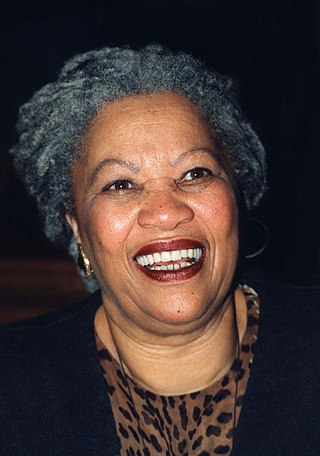
Chloe Anthony Wofford Morrison, known as Toni Morrison, was an American novelist and editor. Her first novel, The Bluest Eye, was published in 1970. The critically acclaimed Song of Solomon (1977) brought her national attention and won the National Book Critics Circle Award. In 1988, Morrison won the Pulitzer Prize for Beloved (1987); she was awarded the Nobel Prize in Literature in 1993.
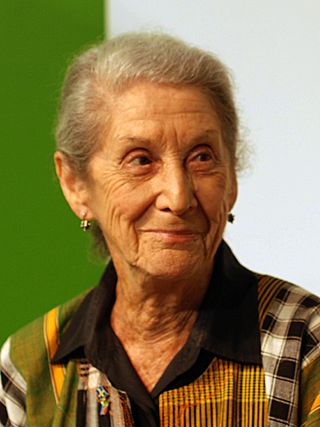
Nadine Gordimer was a South African writer and political activist. She received the Nobel Prize in Literature in 1991, recognised as a writer "who through her magnificent epic writing has ... been of very great benefit to humanity".

American literature is literature written or produced in the United States and in the colonies that preceded it. The American literary tradition is part of the broader tradition of English-language literature but also includes literature produced in languages other than English.
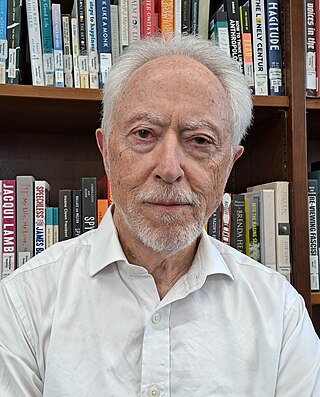
John Maxwell Coetzee FRSL OMG is a South African and Australian novelist, essayist, linguist, translator and recipient of the 2003 Nobel Prize in Literature. He is one of the most critically acclaimed and decorated authors in the English language. He has won the Booker Prize (twice), the CNA Literary Award (thrice), the Jerusalem Prize, the Prix Femina étranger, and The Irish Times International Fiction Prize, and holds a number of other awards and honorary doctorates.

Mark George Tobey was an American painter. His densely structured compositions, inspired by Asian calligraphy, resemble Abstract expressionism, although the motives for his compositions differ philosophically from most Abstract Expressionist painters. His work was widely recognized throughout the United States and Europe. Along with Guy Anderson, Kenneth Callahan, Morris Graves, and William Cumming, Tobey was a founder of the Northwest School. Senior in age and experience, he had a strong influence on the others; friend and mentor, Tobey shared their interest in philosophy and Eastern religions. Similar to others of the Northwest School, Tobey was mostly self-taught after early studies at the Art Institute of Chicago. In 1921, Tobey founded the art department at The Cornish School in Seattle, Washington.

Australian literature is the written or literary work produced in the area or by the people of the Commonwealth of Australia and its preceding colonies. During its early Western history, Australia was a collection of British colonies; as such, its recognised literary tradition begins with and is linked to the broader tradition of English literature. However, the narrative art of Australian writers has, since 1788, introduced the character of a new continent into literature—exploring such themes as Aboriginality, mateship, egalitarianism, democracy, national identity, migration, Australia's unique location and geography, the complexities of urban living, and "the beauty and the terror" of life in the Australian bush.
The poetry of South Africa covers a broad range of themes, forms and styles. This article discusses the context that contemporary poets have come from and identifies the major poets of South Africa, their works and influence.
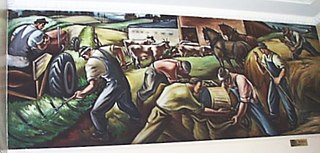
The Northwest School was an American art movement established in the Seattle area. It flourished in the 1930s–40s.
Zoë Wicomb is a South African author and academic who has lived in the UK since the 1970s. In 2013, she was awarded the inaugural Windham–Campbell Literature Prize for her fiction.
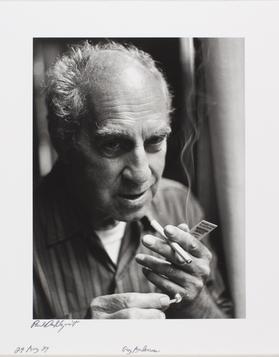
Guy Anderson was an American artist known primarily for his oil painting who lived most of his life in the Puget Sound region of the United States. His work is in the collections of numerous museums including the Seattle Art Museum, the Tacoma Art Museum, and the Metropolitan Museum of Art. He has been called "Perhaps the most powerful artist to emerge from the Northwest School".

Dusklands (1974) is the debut novel by J. M. Coetzee, winner of the 2003 Nobel Prize in Literature. The novel consists of two separate stories, "The Vietnam Project" and "The Narrative of Jacobus Coetzee."

Leila Fuad Aboulela is a fiction writer, essayist, and playwright of Sudanese origin based in Aberdeen, Scotland. She grew up in Khartoum, Sudan, and moved to Scotland in 1990 where she began her literary career. Until 2023, Aboulela has published six novels and several short stories, which have been translated into fifteen languages. Her most popular novels, Minaret (2005) and The Translator (1999) both feature the stories of Muslim women in the UK and were longlisted for the International Dublin Literary Award and Orange Prize. Aboulela's works have been included in publications such as Harper's Magazine, Granta, The Washington Post and The Guardian. BBC Radio has adapted her work extensively and broadcast a number of her plays, including The Insider, The Mystic Life and the historical drama The Lion of Chechnya. The five-part radio serialization of her 1999 novel The Translator was short-listed for the Race In the Media Award (RIMA).

South African literature is the literature of South Africa, which has 11 national languages: Afrikaans, English, Zulu, Xhosa, Sotho, Pedi, Tswana, Venda, Swazi, Tsonga and Ndebele.

Elleke Boehmer, FRSL, FRHistS is Professor of World Literature in English at the University of Oxford, and a Professorial Governing Body Fellow at Wolfson College. She is an acclaimed novelist and a founding figure in the field of Postcolonial Studies, internationally recognised for her research in colonial and postcolonial literature, history and theory. Her main areas of interest include the literature of empire and resistance to empire; sub-Saharan African and South Asian literatures; modernism; migration and diaspora; feminism, masculinity, and identity; nationalism; terrorism; J. M. Coetzee, Katherine Mansfield, and Nelson Mandela; and life writing.

Foe is a 1986 novel by South African-born Nobel laureate J. M. Coetzee. Woven around the existing plot of Robinson Crusoe, Foe is written from the perspective of Susan Barton, a castaway who landed on the same island inhabited by "Cruso" and Friday as their adventures were already underway. Like Robinson Crusoe, it is a frame story, unfolded as Barton's narrative while in England attempting to convince the writer Daniel Foe to help transform her tale into popular fiction. Focused primarily on themes of language and power, the novel was the subject of criticism in South Africa, where it was regarded as politically irrelevant on its release. Coetzee revisited the composition of Robinson Crusoe in 2003 in his Nobel Prize acceptance speech.
J. M. Coetzee is a South African-born novelist, essayist, linguist, translator and recipient of the 2003 Nobel Prize in Literature. He has also won the Booker Prize twice, the Jerusalem Prize, CNA Prize (thrice), the Prix Femina étranger, the Irish Times International Fiction Prize, as well as many other awards and honours, and he holds a number of honorary doctorates and is one of the most acclaimed and decorated authors in the English language.

The 2003 Nobel Prize in Literature was awarded to the South African novelist John Maxwell Coetzee, better known simply as J. M. Coetzee, "who in innumerable guises portrays the surprising involvement of the outsider." He is the fourth African writer to be so honoured and the second South African after Nadine Gordimer in 1991.
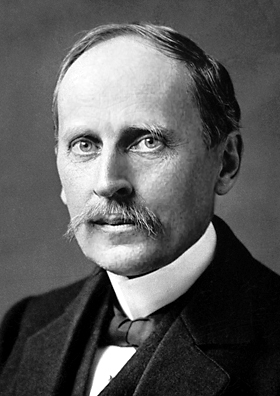
The 1915 Nobel Prize in Literature was awarded to the French author Romain Rolland (1866–1944) "as a tribute to the lofty idealism of his literary production and to the sympathy and love of truth with which he has described different types of human beings." The prize was awarded the following year on November 9, 1916 and he is the third Frenchman who became a Nobel recipient for the literature category.
















